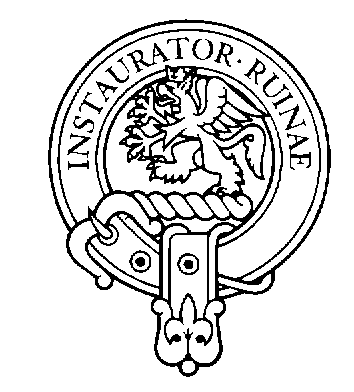Robert Forsyth: 1754-1794
The First U.S. Marshal of Georgia
Robert Forsyth, was born in Scotland in 1754 andsettled inFredericksburg, Virginia in 1774. At the age of 22, Forsyth enlisted in the Continental army after the start of the Revolutionary War. Three years later, on January 10, 1779, he received a commission of Captain in the corps of Partisan Light Dragoons (Lee's Legion) under Major "Lighthorse Harry" Lee.
On September 25, 1789 George Washington appointed Robert Forsyth as the first U.S. Marshal of The Republic of Georgia. Forsyth conducted the first U.S. census for Georgia in 1790.
On January 11, 1794, Marshal Forsyth, while serving acivil court process on two brothers, Beverly and William Allen. Beverly Allen, a former Methodist minister from South Carolina, saw the Marshal approaching, and hid in a room on the second floor of the house. When Forsyth knocked on the door of the room, Allen fired his pistol at the direction of the knocking. The ball hit Forsyth in the head, killing him instantly. He was the first of over 200 Marshals and deputies killed in the line of duty.
In May 2016 The U.S. Marshal’s Office sent a formal request to Alistair Forsyth of that Ilk asking for permission, which was granted, to adopt the Ancient Forsyth tartan as the official tartan of the United States Marshal Service Pipes & Drums Band.
William Forsyth: 1737-1804
Forsythia
The beautiful yellow flower, Forsythia, is named in honor of William Forsyth. Forsyth was gardener to the Duke of Northumberland at Syon House, Chief Gardener at Chelsea Physic Garden and later he was appointed gardener to his Majesty King George III at the St. James and Kensington Palaces. He was also the author of ‘Observations on the Diseases, Defects and Injuries Of All Kinds of Fruit and Forest Trees’ and ‘ A Treatise On The Culture and Management of Fruit Trees’.
John Forsyth: 1780-1841
Statesman
John was born Oct. 22, 1780 in Fredericksburg, VA. He was the son of Col. Robert Forsyth (see 1st U.S. Marshal killed in line of Duty) and Fannie Johnston. Congress voted Col. Forsyth’s widow a gratuity of $2,000, which she used to send John and his brother, Robert, to Princeton University. Robert died shortly after graduation, but John returned to Georgia and opened a law practice in Augusta.
John’s distinguished political career began in 1808 when he became Attorney-General of Georgia. He was next elected to Congress in 1813 and served until 1818, when he was appointed Minister to Spain by
President James Monroe. One of his greatest feats while minister was the negotiation of a treaty cession in 1819 with the King of Spain, resulting two years later in the permanent acquisition of Florida, at no cost to this country.
In 1822 he was again elected to Congress and served until his election as the 23rd Chief Executive of Georgia from 1827-1830. From 1830 to 1834 he was a U.S. Senator and then served as Secretary of State in the cabinets of Presidents Jackson and Van Buren from 1834 until his death on October 21, 1841. He is buried in the Congressional Cemetery.
John Hubbard Forsyth: 1797-1836
Defender of the Alamo
John Hubbard Forsyth, was the son of Alexander and Mary (Treat) Forsyth. He was born in Avon, New York, on August 10, 1797 and raised on his father’s farm in Livingston County, New York. He studied medicine, but never practiced in favor of farming.
After the death of his wife, Deborah Smith, in 1828, he left his only son, Edmund Augustus Forsyth, with his parents and moved to Kentucky before going to Texas with a volunteer cavalry company which eventually arrived at the Alamo with William Travis’ group. He attained the rank of captain in the Texan cavalry and was 38 years old at the time of the battle. He was third in command at the Alamo, only outranked by Travis and Bowie.
Rev. Alexander John Forsyth: 1768-1843
Inventor of the Percussion Lock Firing System for Firearms
Rev. Alexander Forsyth succeeded his father James Forsyth as the Reverend of the old Kirk of Belhelvie in 1790. He was a tinkerer, with a fondness for smithing and like most Scotts of the time, he also had a fondness for bird hunting. He had a problem with the flintlock rifles which had been in use since the 1600’s. They were unreliable and had a tendency for misfiring and the flash from the gunpowder before the shot went off, scared the birds away, so he set about to solve the problem and invented the percussion lock which he patented in 1807.





